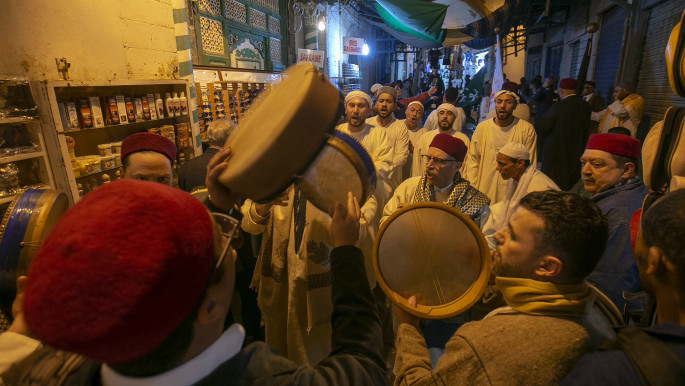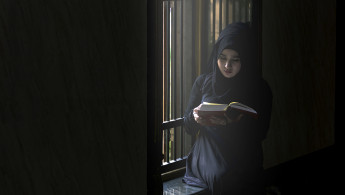Eat, pray, fast: Being a woman and spending Ramadan alone
With Ramadan often being associated with communal gatherings for iftars and prayers, for some individuals it can also feel like hard work while alone.
Changes in life, moving house or country, a new job or changes to your health can play a huge part in how you experience Ramadan and could have an effect on your spirituality. However, for others, a change in their dynamics may bring about positive changes during the holy month.
The New Arab speaks to five women who are living away from home and spending Ramadan alone to find out about their experiences and how they overcame any challenges they may have faced.
For Nabila Bushra, a student from Germany, this year was her first Ramadan away from home and also her first month in London where she has come to study. She lives with a host family who do not fast and this has brought on challenges for her.
"It's hard to have a routine for suhoor and iftar time because I'm preparing food alone. At home I have siblings and parents who wake me up to pray together or to prepare our meals. And obviously I miss my mother's food and spending time with my family and friends."
Spending Ramadan away from home and alone can also mean an extra long list of adulting duties that may have previously been shared among a household.
|
Aeesha Yusuff, a 22-year-old health worker from Nigeria is away from home this Ramadan to do her National Youth Service, which is compulsory for graduates of higher institutions in her country.
"This isn't my first Ramadan away from home but it differs from the rest in the sense that this is my first Ramadan as a full adult, with several bills to pay and an apartment to maintain. There is a sense of 'adulting' that accompanies me this Ramadan that which I never had to worry about before."
As well as extra adulting duties, spending Ramadan alone has given some Muslims the feeling that an extra level of discipline is needed during this holy month in order to engage spiritually.
For Yassmin Abdel Magied, a 28-year-old writer, who has moved to three different cities in the last five years from her home in Australia, spending Ramadan alone comes with the challenge of pushing herself to attend communal acts of worship at the mosque.
"It's more difficult to do the rituals like going to taraweeh and the mosque, you get a lot of momentum when you're in a group of people, it's a bit more difficult to do it alone. It's also hard as a woman to break into a new mosque and find your community."
However, being a month of reflection and worship, being alone has also helped those like Nabila to take their time to be more conscious and reflect.
|
"In a way it has been enriching to go through the process of spending time alone and having time to reflect on the month and connect with yourself," she says.
For Aeesha, Ramadan away from family dynamics has meant an increase in spirituality, "Apart from when I go to work, I have a lot of alone time as I don't go out much. It's a lot of time to read and be very introspective," she explains.
"My family have the strongest hold on my emotions and being with them, although it is the most beloved thing to me, is also one of my strongest trials. Perfecting myself in the sight of Allah in the face of the hold they have on me can sometimes take its toll on my personal spirituality," she adds.
"This Ramadan however, I took up journaling through my spiritual journey and finding a relationship with Allah through prayers. It's being very refreshing."
Community and familySomething that has helped Yassmin practically is an iftar WhatsApp group which acts as a way to check in on each other and have the occasional iftar together to create a Ramadan feeling often missed when alone.
"You just have to accept Ramadan away from home is different, treasure the memories of the past but don't feel like you have to create the exact same ones going forward. You can create your own traditions and rituals," Yassmin says.
 |
|
| Read also: A mix of traditional sounds liven up Ramadan nights in Tunis |
Finding pockets of community also has helped Nabila who has attended university events, iftar gatherings and Rumi's Cave where she not only meets other Muslims, but also gets to hear spiritual and productive talks which have been motivating.
For Raifah Rafiq, 26, a trainee lawyer and podcaster, who moved out of her family home last year, this Ramadan work has been a pleasant distraction while missing the family and communal aspect back home.
"I miss the community, the smell of food and nasheeds playing in the background and the overall connection to each other as you are all taking part in an obligation and able to motivate one another."
For Raifah, making Ramadan easier while alone has also been about practicalities and taking off the ease of adulting alone.
"I cook in bulk to make it easier to manage work and Ramadan alone. I also have had my aunties make food in bulk for me to ease the process so I can quickly pop food in the microwave".
Ramadan in a Muslim majority countrySalma, (name changed to give anonymity) a Londoner who moved to a Muslim majority country for work, the change is one she welcomed given how much presence the holy month has in the country. There are whole shopping centres and supermarkets celebrating Ramadan, rather than just the odd aisle like in London, a flurry of communal gatherings, changes to working hours and suhoor drive-thrus being a norm, she reveals.
"When I first got here the thing that struck me was seeing the Ramadan decorations in the malls and seeing Ramadan Kareem plastered on shop fronts. To me it felt like Christmas in a Muslim majority country, except it's for Ramadan," Salma says.
For Salma the biggest change was the amount and variation of activities to take part in, from mosque events, to suhoor tents and gatherings. The change in work hours also allowed her to be more mindful of the month and take advantage of all that's on offer.
"Although it was difficult and I spent iftars alone, I've also had many opportunities to make new friends. Most of my friends are Ramadan friends who I met at the mosque, at iftars and suhoors," she says.
"Where I am staying, there is a huge tradition of suhoor tents, which sees buffets at five star hotels starting at 10:30pm. It was initially a weird and intriguing thing for me, I remember running to the mall to buy heels and a clutch for my first one.
"Even though it was really alien to me, I started to really enjoy the celebratory nature of Ramadan that a Muslim majority country brings with an array of things to do on offer. Being able to hang out with my friends and stay out till 3am... and all of this being normal in a working week, there is definitely a vibe," says Salma.
Suhoor parties is something that threw UK audiences last Ramadan when makeup company MAC released a get ready for suhoor campaign with makeup tutorials.
Read more here: I don't need your suhoor makeover, MAC
"At first I was really critical of the waste and opulence at these parties but I saw the other side of people who are far away from families being brought together. I also ended up finding people from my home city," Salma adds.
"I do feel like London does have a lot more community efforts and I miss that aspect, but I am nevertheless enjoying the difference this new move brings."
Away from home and not fastingFor Anisah, a 25-year-old CEO of 23 Code Street, running a company means it's very difficult to take a month off to go back home to Nottingham. Her Ramadan experience has also been different due to not being able to fast this year.
 |
|
| Read also: Understanding those with mental health issues this Ramadan |
"This year I have stayed away from public gatherings and iftars as I haven't been fasting and I felt uncomfortable," she begins.
Ramadan experiences also can look very different year on year with family members passing away.
"I miss going to the mosque with my grandad like I used to do when I was younger. I miss the constant stream of guests. I'm lucky my nanny lives here so I at least have that home to go to at the weekend," she adds.
"I will be going to the mosque in the morning. Since my grandad passed away, I have taken on the tradition of going to Eid prayers, buying sweets, and then taking them back to my nanny. Inshallah this year will be no different."
Nafisa Bakkar is the co-founder of amaliah.com, an online publisher that creates culturally relevant content for and by Muslim women.



